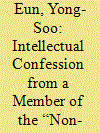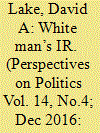| Srl | Item |
| 1 |
ID:
165473


|
|
|
|
|
| Summary/Abstract |
David Lake wrote that International Relations (IR)1 will be a more diverse and better field of study if we embrace varied “life experiences and intuitions,” especially those of “marginalized” scholars, about politics and how the world works. Although concurring with his admonition, I also believe that his call for “greater diversity” in IR and his approach to realizing it need to be subject to critical scrutiny, being reconsidered in terms of reflexivity—more specifically, self-reflection by “marginalized” scholars. For this reason, as a “non-white” scholar working in a “non-Western” (or, in Lake’s words, “underrepresented”) IR community, I want to make my own confession to better understand what is at stake in promoting diversity in the academy from a different angle.
|
|
|
|
|
|
|
|
|
|
|
|
|
|
|
|
| 2 |
ID:
150524


|
|
|
|
|
| Summary/Abstract |
Drawing largely on my own career in academia, I elaborate on the need for greater gender, racial and other forms of diversity in International Relations. Although theories are thought to be “objective,” what goes into those theories and, in turn, their explanatory power is ultimately shaped by subjective, lived experiences. Different individuals with different life stories will develop different intuitions about how the world “works,” and thus will write different theories to capture those intuitions and, in turn, larger patterns of politics. I explain here how my life experience as a privileged white male has shaped the intellectual contours of my work on international hierarchy. Building from this foundation, I then explore how professional practices elevate as gatekeepers individuals with generally similar life experiences and, thus, intuitions about what constitutes “good” work in the field, which in turn reinforces those professional practices and priorities. The final section focuses on problems of eroding the disciplinary hierarchy and broadening the pipeline into the profession.
|
|
|
|
|
|
|
|
|
|
|
|
|
|
|
|